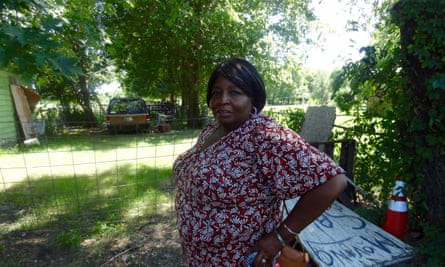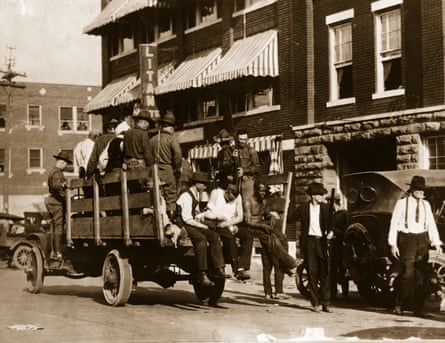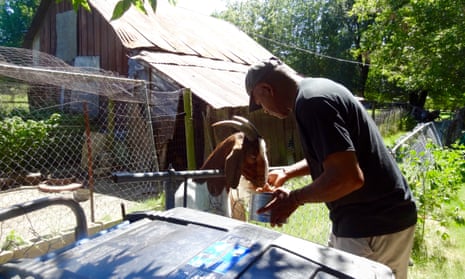As a young girl in Mississippi, Demalda Newsome once found some sweet potatoes sprouting outside. Excited at her discovery, she presented them to her grandmother, who angrily ordered the root vegetables out of her house. People should eat things from the ground only out of poverty, her grandmother said.
Now as a 59-year-old grandmother herself, Newsome still hears this view expressed as she works to combat food insecurity in the low-income neighbourhood of north Tulsa, Oklahoma. The state ranks among the worst in the US for national fruit and vegetable consumption, and has one of the lower average national hourly wages: US $7.25 (£5.53).
“We launched different school garden initiatives, but they just caused a racial divide,” Newsome explains, while driving along a near-deserted north Tulsa avenue one recent sweltering morning. “The black teachers didn’t want to do it. Black women have moved away from gardening so much and, to them, it is just like bringing them back to slavery. I never felt like that. If you want something, if you want to eat better, you better feed yourself.”
But feeding oneself can be complicated in this neighbourhood. Tulsa, a city of nearly 400,000, is considered one of the nation’s worst food deserts (places with officially “low access” to supermarkets). Only 7% of its residents are said to be able to walk to a grocery store within five minutes.
Typical household incomes in north Tulsa hover at around $20,000, and dip lower in Turley, a community at the city’s northernmost edge. It’s not uncommon for families here to struggle to purchase healthy – or simply enough – food at the one full-service grocery store left in all of north Tulsa. Other people, unable to pay off former tenants’ outstanding water or electricity bills, live with these basic amenities shut off so cannot cook.

The “urban gardening” trend, having taken off in the form of community and rooftop gardens from Asia to Europe, is seen as a partial solution to US food insecurity by some experts. In theory, local gardens can help people with low incomes and limited or uncertain access to nutritious food gain reliable sources of produce. Yet in Tulsa and nearby Oklahoma City, gardening initiatives such as the Newsomes’ have a hard time overcoming the immediacy of people’s hunger, and the complex racial history and financial constraints that divide this south-midwestern state.
Newsome and her husband are long-time pioneers of black community farming in Tulsa. Their organisation, Newsome Community Farms, opened its farmers’ market in 1999, employing 10 young people at a time with stipends to work on their five-acre farm. The Newsomes’ focus has always been on training more gardeners and farmers, and Demalda still works with a group of Hmong immigrant farmers. Community gardening activity at their farm has dwindled over the last three years, but they still plan to sell greens and honey at market rates on their front garden this autumn.
Sharp racial divisions in Tulsa, which tend to coincide with food deserts (as they do throughout the US), extend beyond maps, Demalda Newsome says. The city’s legacy is still charged by the Tulsa race riots of 1921, which saw an affluent black neighbourhood burned and approximately 300 people killed. “There’s a lot of conversations about the conversations here – but there’s no resolution, no problem solving,” she says.
Though she partners closely with two other Tulsa initiatives, Newsome says she finds few opportunities open to her as a black woman. “Racism is not out in the open. Nobody says, ‘I am not giving you the money, I don’t trust you with the money’ – but then you see another place getting the money that is white-run, and what else can you think?”

Newsome believes it’s easier to tackle food insecurity at a national level – she sits on several food organisations’ boards – than locally, where “people won’t address what is going on”. She thinks this happens, in part, because of a lack of grassroots community involvement in food insecurity forums.
Other black urban gardeners in Oklahoma share these feelings of exclusion. Bryan Wright, a teacher, launched an urban gardening project in Oklahoma City last year after he realised he was the only black person at a sustainability conference.
Wright uses holistic, permaculture principles in his work with Bugs, the Black Urban Gardening Society (as distinct from the similarly named New York-based network). On a recent hot day, only two families and one middle school student braved the 38C weather for a meeting, but 40 people have been known to attend, he says.
“We have this history of forced agrarian work, so when I have kids out here the first thing they will say is, ‘Man, we slaves’,” Wright says. “They joke with it, but you have to reach the kids. We are dealing with major food insecurity, so having an outlet where we’re able to harvest food is extremely beneficial.”
Despite its food deserts, Oklahoma was once a nationally competitive agriculture producer. Almost every native Oklahoman used to farm, or knows someone who did, says Ron Robinson, head of the Third Place community centre which runs a weekly food pantry and a community garden in Turley. Third Place planted the garden, now in its second year of production, after purchasing a row of dilapidated houses for $12,000 and razing them to the ground.

Turley residents in the know can trek up to the garden with shopping carts to pick peaches or receive free breakfasts on weekends. But anxieties surrounding food prevail: according to a 2013 Oklahoma University study, more than half of shoppers at the Third Place food pantry displayed low food security and said they had experienced anxiety over having enough food to eat.
“Most people used to have good food, and the older people will have that in their history,” says Bonnie Ashing, a volunteer who runs the garden and is married to Robinson. “But the younger people don’t remember it at all.”
Ashing says use of Third Place’s community garden is still plagued with doubts and a lack of knowledge among its potential users. “People have expressed fear: ‘What if somebody picks my food? Don’t you lock your garden?’ Or some people will want to pick the produce all at once, before it is ripe.”
Claudette Schexnider, 54, remembers eating sliced cucumbers and cherry tomatoes growing up on her family’s farm outside Oklahoma City. Now, her food budget limits her weekly purchases to “the basics”, such as eggs and toast. She also receives free groceries once a month from the food pantry at Third Place.
After two heart attacks, Schexnider does not have the physical ability to consider gardening. She wants another grocery store that is cheaper and better quality than the only one in North Tulsa which currently stocks a small supply of fresh food.
“Urban farming is one piece of many bigger issues like structural inequality, pollution, health issues, and investment in these communities,” says Laura Lawson, dean of the office of agriculture and urban programmes at Rutgers University. “People can get involved in the community, and that is a really great thing, but it is not going to resolve the larger community problems that are shaping the food desert issue.”

In Tulsa, healthy eating is simply not part of the broad culture any more, while urban gardening is viewed as a “little bit of a white trend solution”, according to Justin Pickard, director of Crossover Community Impact. This local Christian community development organisation is planting fruit trees in the gardens of Tulsa residents, and alongside a highway. They might prove easier to maintain than an urban farm.
Meanwhile Wright, founder of Bugs in Oklahoma City, is hoping to grow a perennial, year-round “urban forest”, so the community garden’s supply is not limited to a few months each year. Unfortunately, his organisation operates on virtually no budget; a common situation in Oklahoma. The energy-rich state has a financially strapped state government, but Oklahoma’s Republican leadership impacts even organisations such as the Regional Food Bank of Oklahoma, which feeds 116,000 Oklahomans weekly but is forced to forge its own path without any public support.
“The [state] government doesn’t think it’s their responsibility to help people, but there are a lot of good people doing good things,” says Katie Plohocky, co-founder of the Tulsa-based mobile grocery R&G Family Grocers. “Without that, we would be in big trouble.”
Newsome says she and her husband are considering leaving Tulsa, perhaps for Philadelphia to be with her son, who is also involved in community gardening. “I didn’t believe it until I was there: you have gardens on every corner in low-income neighbourhoods, and you don’t have to talk people into it. You have elders, young people, everyone just coming out.”
By comparison, Newsome says she is worried for the future in Oklahoma – particularly when “band-aids to the wound”, such as Ron Robinson’s Third Place community centre, disappear. She and her husband are disappointed and disillusioned with the funding reality they continue to confront. But for now at least, the work still continues, and they take it day by day.
Follow Guardian Cities on Twitter and Facebook to join the discussion

Comments (…)
Sign in or create your Guardian account to join the discussion